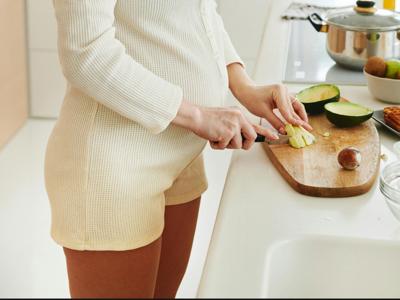
(Photo by Foodie Factor via Pexels)
By Stephen Beech
Eating avocados during pregnancy lowers the risk of food allergies for babies, according to new research.
The study involving 2,272 mother-baby pairs in Finland found that tots had 44% lower odds of developing food allergies at 12 months old if their mother consumed fresh avocado while pregnant.
Decades of research have explored the relationship between maternal diet and allergies in infants.
But the new study, published in the journal Pediatric Research, is the first to link avocados in the maternal diet to a lower risk of potentially deadly food allergies, which affect around one in 13 children.
Study author Doctor Sari Hantunen, of the University of Eastern Finland, said: “As a caregiver, the growing prevalence of food allergy feels very scary and out of my control.

(Photo by Matilda Wormwood via Pexels)
“There is no cure for food allergy, but promising prevention and therapeutic strategies are in development as well as emerging research such as this."
The research team analysed data collected from 2013 to 2022.
Avocado intake was assessed using an online food frequency questionnaire during the first and third trimesters.
Participants who reported eating any avocado in either trimester were defined as avocado consumers.
Infant allergic outcomes - including rhinitis, paroxysmal wheezing and eczema - were evaluated at 12 months old.

(Photo by RDNE Stock project via Pexels)
After adjusting for factors including gestational age at delivery, education, diet quality, smoking, alcohol consumption and breastfeeding, food allergy was found to be "significantly higher" in infants of non-avocado consumers (4.2%) compared to avocado consumers (2.4%).
No associations were found for other allergic conditions when all other factors were considered.
The findings showed that mums who ate avocado during pregnancy tended to be older at delivery, be less likely to undergo a caesarean delivery, be non-smokers, breastfeed for a longer duration, have higher diet quality scores, and have lower BMI levels in the first trimester.
Dr. Hantunen said findings from the study cannot establish causation or be applied to all audiences, but - while more research is needed to understand the exact mechanism - they "underscore" the value of avocados.
She added: "Based on these findings, it’s encouraging to know that eating avocados may provide even more value to maternal and children’s health, beyond the benefits that have already been established through scientific research.”
Current NHS guidelines recommend that pregnant women eat at least five daily portions of a variety of fruit and vegetables, which can be fresh, frozen, canned, dried or juiced.







